- Home
- Fergus Hume
Hagar of the Pawn-Shop Page 6
Hagar of the Pawn-Shop Read online
Page 6
“Ah!” exclaimed Miss Lyle, joyfully—“and on that very evening Rosa was out, and did not return till nine!”
“Me went to see Massa Jevons for you,” said Rosa vehemently; “you send me.”
“I send you! Just listen to the creature’s lies! Besides, Mr. Jevons’s rooms are in Duke Street, St James’s, whereas it was at Lambeth you were.”
“I no go to dat gem’man’s house. You send me to de train Waterloo!”
“Waterloo!” said Horval, looking sharply at Rosa. “You were there?”
“Yis, masse; me dere at seven and eight.”
“In the neighbourhood of Lambeth,” murmured Horval. “She might have gone to the pawn-shop after all.”
“Of course she did!” cried Miss Lyle, vindictively—“and pawned the amber beads of my poor dead friend!”
“She did nothing of the sort!” interposed Hagar, with spirit. “Whosoever pawned the beads, it was not this woman. Besides, how do you know that Rosa killed Mrs. Arryford?”
“She wanted the beads, young woman, and she killed my friend to obtain them.”
“No, no! dat one big lie!”
“I am sure it is!” said Hagar, her face aflame. “I believe in your innocence, Rosa. Mr. Horval,” she added, turning to the detective, “you can’t arrest this woman, as you have no grounds to do so.”
“Well, if she didn’t pawn those beads ——”
“She did not, I tell you.”
“She did!” cried Miss Lyle angrily. “I believe you are an accomplice of the creature’s!”
What reply Hagar would have made to this accusation it is impossible to say, for at this moment a young man walked into the room. He was good-looking in appearance, and smart in dress, but there was a haggard look about his face which betokened dissipation.
“This,” said Miss Lyle, introducing him, “is my nephew, the heir to the property of my late dear friend. He is resolved, as such heir, to find out and punish the assassin of his benefactress. For my part, I believe Rosa to be guilty.”
“And I,” cried Hagar, with energy, “believe her to be innocent!”
“Let us hope she is,” said Jevons, in a weary voice, as he removed his gloves. “I am tired of the whole affair.”
“You are bound to punish the guilty!” said Miss Lyle, in hard tones.
“But not the innocent,” retorted Hagar, rising.
“Young woman, you are insolent!”
Hagar looked Miss Lyle up and down in the coolest manner; then her eyes wandered to the well-dressed figure of Jevons, the heir. What she saw in him to startle her it is difficult to say; but after a moment’s inspection she turned pale with suppressed emotion. Stepping forward, she was about to speak, when, checking herself suddenly, she beckoned to Horval, and advanced towards the door.
“My errand here is fulfilled,” she said, quietly. “Mr. Horval, perhaps you will come with me.”
“Yes, and you can go also, Rosa,” cried Miss Lyle, angered by the insulting gaze of the girl. “I am mistress here in my nephew’s house, and I refuse to let a murderess remain under its roof!”
“Be content,” said Hagar, pausing at the door. “Rosa shall come with me; and when you see us again with Mr. Horval, you will then learn who killed Mrs. Arryford, and why.”
“Insolent hussy!” muttered Miss Lyle, and closed the door on Hagar, Horval and the black woman.
The trio walked away, and shortly afterwards picked up an omnibus, in which they returned to the Lambeth pawnshop. Hagar talked earnestly to Horval the whole way; and from the close attention which the detective paid to her it would seem that the conversation was of the deepest interest. Rosa, a dejected heap of misery, sat with downcast eyes, and at intervals wiped away the tears which ran down her black cheeks. The poor negress, under suspicion as a thief and a murderess, turned out of house and home, desolate and forsaken, was crushed to the earth under the burden of her woes. On her the fetish necklace of amber beads had brought a curse.
On arriving at the shop Hagar conducted Rosa into the back parlor; and after a further conference she dismissed the detective.
“You can stay with me for a week,” she said to Rosa.
“And den what you do?”
“Oh,” said Hagar, with an agreeable smile, “I shall take you with me to denounce the assassin of your late mistress.”
All that week Rosa stayed in the domestic portion of the pawn-shop, and made herself useful in cooking and cleaning. Hagar questioned her closely concerning the events which had taken place on the night of the murder in the house at Bedford Gardens, and elicited certain information which gave her great satisfaction. This she communicated to Horval when he one day paid her a hurried visit. When in possession of the facts, Horval looked at her with admiration, and on taking his leave he paid her a compliment.
“You ought to be a man, with that head of yours,” he said; “you’re too good to be a woman!”
“And not bad enough to be a man,” retorted Hagar, laughing. “Be off with you, Mr. Horval, and let me know when you want me up West.”
In four more days Horval again made his appearance, this time in a state of the greatest excitement. He was closeted with Hagar for over an hour, and at its conclusion he departed in a great hurry. Shortly after noon Hagar resigned the shop into Bolker’s charge, put on hat and cloak, and ordered Rosa to come with her. What the reason of this unexpected departure might be she did not inform the negress immediately; but before they reached their destination Rosa knew all, and was much rejoiced thereat.
Hagar took Rosa as far as Duke Street, St James’s, and here, at the door of a certain house, they found the detective impatiently waiting for them.
“Well, Mr. Horval,” said Hagar, coming to a stop, “is he indoors?”
“Safe and sound!” replied Horval, tapping his breastcoat pocket— “and I have got you know what here. Shall we come up?”
“Not immediately. I wish to see him by myself first. You remain outside his door, and enter with Rosa when I call you.”
Mr. Horval nodded, with a full comprehension of what was required of him, and the trio ascended the dark staircase. They paused at a door on the second landing. Then Hagar, motioning to her companions that they should withdraw themselves into the gloom, rapped lightly on the portal. Shortly afterwards it was opened by Mr. Frederick Jevons, who looked inquiringly at Hagar. She turned her face towards the light which fell through the murky staircase window, whereat, recognizing her, he stepped back in dismay.
“The pawn-shop girl!” said he in astonishment. “What do you want?”
“I wish to see you,” replied Hagar, composedly, “but it is just as well that our conversation should be in private.”
“Why, you can have nothing to say to me but what the whole world might hear!”
“After I have mentioned the object of my visit you may think differently,” said Hagar, with some dryness. “However, we’ll talk here if you wish.”
“No, no; come in,” said Jevons, standing on one side. “Since you insist upon privacy, you shall have it. This way.”
He showed her into a large and rather badly furnished room. Evidently Mr. Fred Jevons had not been rich until he inherited the fortune of Mrs. Arryford.
“I suppose you will be moving to the Bedford Gardens house soon?” said Hagar, sitting composedly in a large armchair.
“Is that what you came to speak to me about?” retorted Jevons, rudely.
“Not exactly. Perhaps, as you are impatient, we had better get to business.”
“Business! What business can I have to do with you?”
“Why,” said Hagar, quietly, and looking directly at him, “the business of those amber beads which you—pawned.”
“I,” stammered Jevons, drawing back with a pale face.
“Also,” added Hagar, solemnly, “the business which concerns the commission of a crime.”
“A—a—a crime!” gasped the wretched creature.
“Yes—the
most terrible of all crimes—murder!”
“What—what—what do you—you mean?”
Hagar rose from her chair, and, drawn to her full height, stretched out an accusing arm towards the young man. “What I mean you know well enough!” she said, sternly. “I mean that you murdered Mrs. Arryford!”
“It’s a lie!” cried Jevons, sinking into a chair, for his legs refused to support him longer.
“It is not a lie—it is the truth! I have evidence!”
“Evidence!” He started up with dry and trembling lips.
“Yes. Through her influence over Mrs. Arryford, your aunt induced her to make you her heir. You are fond of money; you are in debt, and you could not wait until the old lady died in the course of nature. On the night of the murder you were in the house.”
“No, no! I swear ——”
“You need not; you were seen leaving the house. To throw suspicion on Rosa you disguised yourself as a negress, and came to pawn the amber bead necklace at my shop. I recognized that the supposed black woman was minus the little finger of the right hand. You, Mr. Jevons, are mutilated in the same way. Again, I paid you with a five-pound note. Of that note I took the number. It has been traced by the number, and you are the man who paid it away. I saw ——”
Jevons jumped up, still white and shaking. “It’s a lie! a lie!” he said, hoarsely. “I did not kill Mrs. Arryford; I did not pawn the beads. I did ——”
“You did both those things!” said Hagar, brushing past him. “I have two witnesses who can prove what I say is true. Rosa! Mr. Horval!”
She flung the outside door wide open, while Jevons again sank into the arm-chair, with an expression of horror on his white face. “Rosa! Horval!” he muttered. “I am lost!”
Rosa and the detective entered quickly in response to Hagar’s call, and with her looked down on the shrinking figure of the accused man.
“These are my witnesses,” said Hagar, slowly. “Rosa!”
“I saw dat man in de house when my missy died,” said the negress. “I hear noise in de night; I come down, and I see Massa Jevons run away from de room of my missy, and Missus Lyle let him out by de side door. He kill my poo’ missy—yes, I tink dat.”
“You hear,” said Hagar to the terrified man. “Now, Mr. Horval.”
“I traced the five-pound note you gave him by its number,” said the detective. “Yes, he paid it away at his club; I can bring a waiter to prove it.”
“You hear,” said Hagar again; “and I know by the evidence of your lost finger that you are the man, disguised as a negress, who pawned the necklace which was stolen from the person of Mrs. Arryford, after you murdered her. The dead woman, as Rosa tells us, wore that necklace night and day. Only with her death could it have been removed. You murdered her; you stole the necklace of amber beads.”
Jevons leaped up: “No, no, no!” he cried, loudly, striking his hands together in despair. “I am innocent!”
“That,” said Horval, slipping the handcuffs on his wrists, “you shall prove before a judge and jury.”
When Jevons, still protesting his innocence, was removed to prison, Hagar and the negress returned to Carby’s Crescent. It can easily be guessed how she had traced the crime home to Jevons. She had noticed that the negress who pawned the beads had no little finger. On being brought face to face with Rosa, she had seen that the woman had not lost the finger; and when Jevons had removed his gloves she had seen in his right hand the evidence that he was one with the mysterious black woman of the pawn-shop. Still, she was not certain; and it was only when Rosa had deposed to the presence of the man at midnight in the Bedford Gardens house, and when Horval had traced the five-pound note of which she had taken the number, that she was certain that Jevons was the murderer. Hence the accusation; hence the arrest. But now the fact of his guilt was clearly established. To obtain the wealth of Mrs. Arryford the wretched man had committed a crime; to hide that crime and throw the blame on Rosa he had pawned the amber beads; and now the amber beads were about to hang him. In the moment of his triumph, when preparing to enjoy the fruits of his crime, Nemesis had struck him down.
The news of the arrest, the story of the amber beads, was in all the papers next day; and next day, also, Miss Lyle came to see Hagar. Pale and stern, she swept into the shop, and looked at Hagar with a bitter smile.
“Girl!” she said, harshly, “you have been our evil genius!”
“I have been the means of denouncing your accomplice, you mean,” returned Hagar, composedly.
“My accomplice; no, my son!”
“Your son!” Hagar recoiled, with a startled expression. “Your son, Miss Lyle?”
“Not Miss, but Mrs. Lyle,” returned the gaunt, pale woman; “and Frederick Jevons is my son by my first husband. You think he is guilty; you are wrong, for he is innocent. You believe that you will hang him; but I tell you, girl, he will go free. Read this paper,” she said, thrusting an envelope into the hand of Hagar, “and you will see how you have been mistaken. I shall never see you again in this life; but I leave my curse on you!”
Before Hagar could collect her wits, Miss—or rather Mrs.—Lyle, as she called herself, went hurriedly out of the shop. Her manner was so wild, her words so ominous of evil, that Hagar had it on her mind to follow her, and, if possible, prevent the consequences of her despair. She hurried to the door, but Mrs. Lyle had disappeared, and as there was no one to mind the shop, Hagar could not go after her. Luckily, at this moment Horval turned the corner, and at once the girl beckoned to him.
“Miss Lyle—did you see her?”
“Yes,” said Horval, with a nod “she’s on her way across Westminster Bridge.”
“Oh, follow her—follow her quickly!” cried Hagar, wildly, “she is not herself; she is bent on some rash deed!”
Horval paused a moment in bewilderment; then, grasping the situation, he turned, without a word, and raced down the street in the trail of Miss Lyle. Hagar watched his hurrying figure until it turned the corner; then she retreated to the back parlor, and hurriedly opened the envelope. On the sheet of paper she found within the following confession was written:
“I am not a spinster, but a widow,” began the document abruptly— “a twice-married woman. By my first husband I had Frederick Jevons, who passes as my nephew, and whom I love better than my own soul. When my second husband, Mr. Lyle, died, I cast about for some means of employment, as I was poor. Mrs. Arryford advertised for an unmarried woman as a companion; she absolutely refused to have any companion but a spinster. To get the situation, which was a good one, as Mrs. Arryford was rich, I called myself Miss Lyle, and obtained the place. Mrs. Arryford had no relatives and much money, so I schemed to obtain her wealth for my son, whom I introduced as my nephew. Rosa, the black maid, had a great deal of influence over her weak-minded mistress, and in some way—I don’t know how—she fathomed my purpose. It was a battle between us, as Rosa was determined that I should not get the money of Mrs. Arryford for my son. Finally I triumphed, and Frederick was left sole heir of all the old lady’s wealth. Then Rosa learnt, by eavesdropping, the true relationship between myself and Frederick. She told her mistress, and with Mrs. Arryford I had a stormy scene, in which she declared her intention of revoking her will and turning me and my son out on the world as paupers. I begged, I implored, I threatened; but Mrs. Arryford, backed up by that wicked Rosa, was firm. I sent for my son to try and soften the old lady, but he was not in town, and did not come to see me till late at night. When he arrived I told him that I had killed Mrs. Arryford. I did so to prevent her altering her will, and out of love for my dear son, lest he should lose the money. Frederick was horrified, and rushed from the house. I believe Rosa saw me let him out by the side door. I was determined to throw the blame on Rosa, as I hated her so. Knowing that she coveted the neck lace of amber beads, I stole it from the neck of the dead woman and gave it to my son next day. I suggested that he should dress up as Rosa, and pawn the necklace, so that she might be suspected.
To save me, he did so. I obtained a dress that Rosa was fond of wearing— yellow silk trimmed with black beads; also the jewelry of the creature. Frederick blackened his face, and pawned the beads in a pawn-shop at Lambeth. I sent Rosa on a pretended errand to Waterloo Station, at the time Frederick was pawning the beads, so as to get evidence against her that she was in the neighborhood. Then I suggested to Horval, the detective, that the beads might have been pawned. He found the shop, and I thought my plot had succeeded; that Rosa would be condemned and hanged. Unfortunately, the woman who kept the pawn-shop was clever, and traced Frederick by means of his mutilated right hand. I hate her! Frederick is now in prison on a charge of murder, which he did not commit. I am guilty. I killed Mrs. Arryford. Frederick knows nothing. He helped me to save myself by trying to throw the blame on Rosa. All useless. I am guilty, and I am determined that he shall not suffer for my sin. Officers of the law, I command you to release my son and arrest me. I am the murderess of Mrs. Arryford. I swear it.
JULIA LYLE.
“Witnesses:
“Amelia Tyke (housemaid). “Mark Drew (butler).”
Hagar let the document fall from her hands with a sensation of pity for the wretched woman.
“How she must love her son,” thought the girl, “to have murdered a kind and good woman for his sake! It is terrible! Well, I suppose he will now be released and will enter into possession of the wealth his mother schemed to obtain for him. But he must do justice to Rosa for all the trouble he has caused her. He must give her an annuity, and also the necklace of amber beads, which has been the cause of tracing the crime home to its door. As for Mrs. Lyle ——”
At this moment, white and breathless, Horval rushed into the parlor. Hagar sprang to her feet, and looked anxiously at him, expectant of bad news. She was right.
“My girl,” cried Horval, hoarsely, “Miss Lyle is dead!”
“Dead? Ah!” said Hagar to herself. “I thought as much.”
“She threw herself over Westminster Bridge, and has just been picked out of the water—dead!”

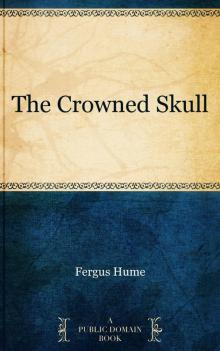 The Crowned Skull
The Crowned Skull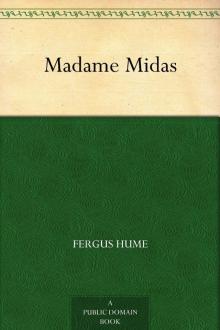 Madame Midas
Madame Midas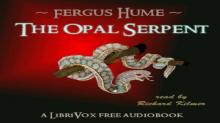 The Opal Serpent
The Opal Serpent The Solitary Farm
The Solitary Farm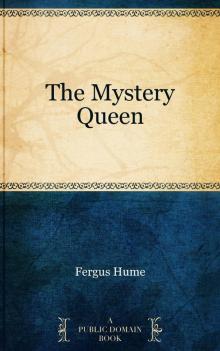 The Mystery Queen
The Mystery Queen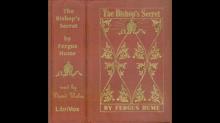 The Bishop's Secret
The Bishop's Secret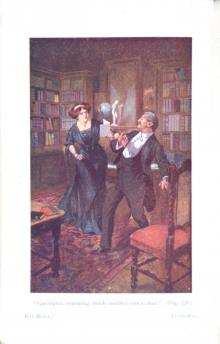 Red Money
Red Money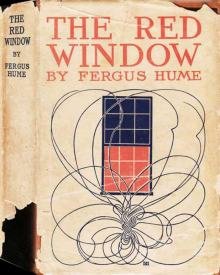 The Red Window
The Red Window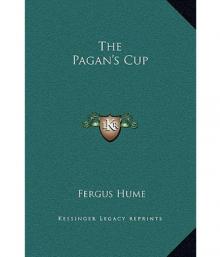 The Pagan's Cup
The Pagan's Cup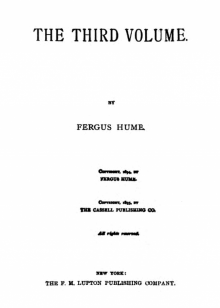 The Third Volume
The Third Volume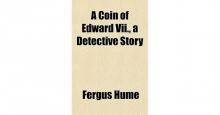 A Coin of Edward VII: A Detective Story
A Coin of Edward VII: A Detective Story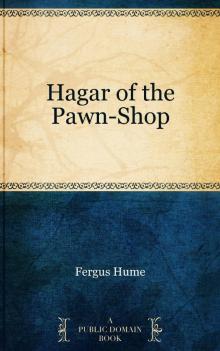 Hagar of the Pawn-Shop
Hagar of the Pawn-Shop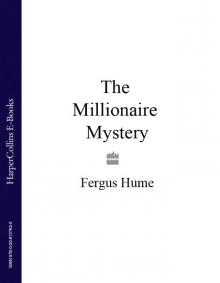 The Millionaire Mystery
The Millionaire Mystery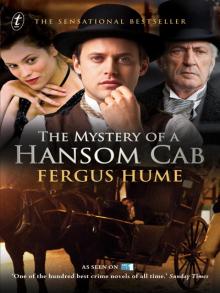 The Mystery of a Hansom Cab
The Mystery of a Hansom Cab